Department of Philosophy
The Department of Philosophy is part of the College of Liberal Arts and Sciences and offers both a Major and a Minor in Philosophy.
The Department counts 21 full-time faculty members working in a variety of specialties, who are active scholars committed to undergraduate education. They share their expertise in a wide variety of philosophical schools, national traditions, historical periods, and specialized areas of philosophical work.
The curriculum is designed to provide students with a foundation in the history of philosophy and also to encourage students to pursue work in their own areas of interest. Formal coursework is only one part of the Philosophy student's education. Since inquiry and study are most fruitful when conducted in a vital community of fellow scholars, the Department is committed to offering a number of excellent learning opportunities that go beyond traditional classroom structures.
Office Hours
Fall 2025 Exam Week Office Hours
Faculty Office Hours Finals Week Fall 2025
BackCongratulations Are In Order

Professor Teresa Castelao-Lawless (left), Professor Alycia LaGuardia-LoBianco (center), and Professor Andrew Spear (right) at the Tenure and Promotion Reception on September 11, 2025 in the GVSU Alumni House.
Congratulations to Professor Alycia LaGuardia-Lobianco on the promotion to Associate Professor and Tenure, and also to Professor Ronald Loeffler on the promotion to Full Professor!
Course Advertisement
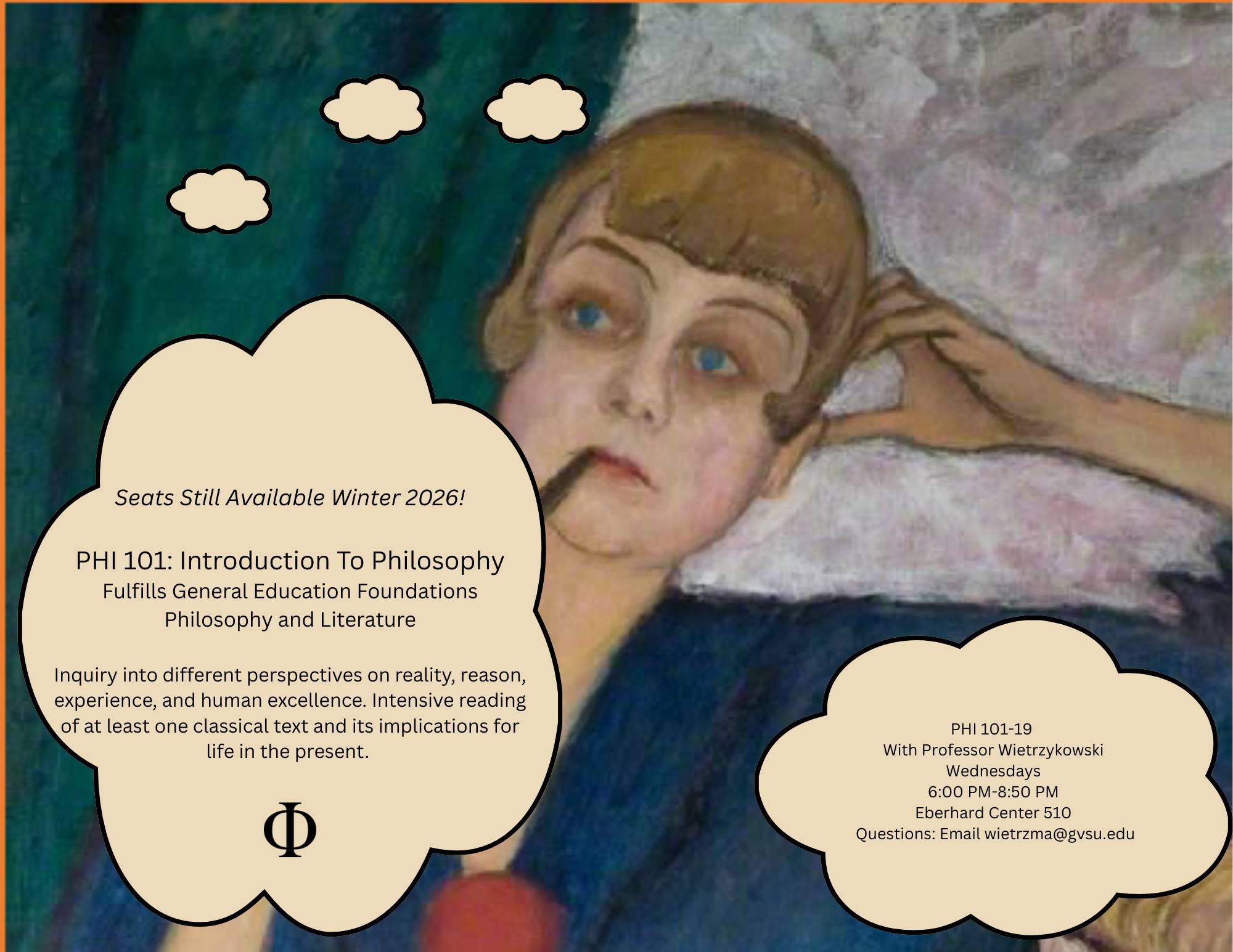
PHI 101: Introduction to Philosophy
Inquiry into different perspectives on reality, reason, experience, and human excellence. Intensive reading of at least one classical text and its implications for life in the present.
Fulfills General Education Foundations Philosophy and Literature
PHI 101-19 With Professor Wietrzykowski (Questions?: Email [email protected]) on Wednesdays from 6:00 PM-8:50 PM in the Eberhard Center Room 410
Seats Still Available For Winter 2026!
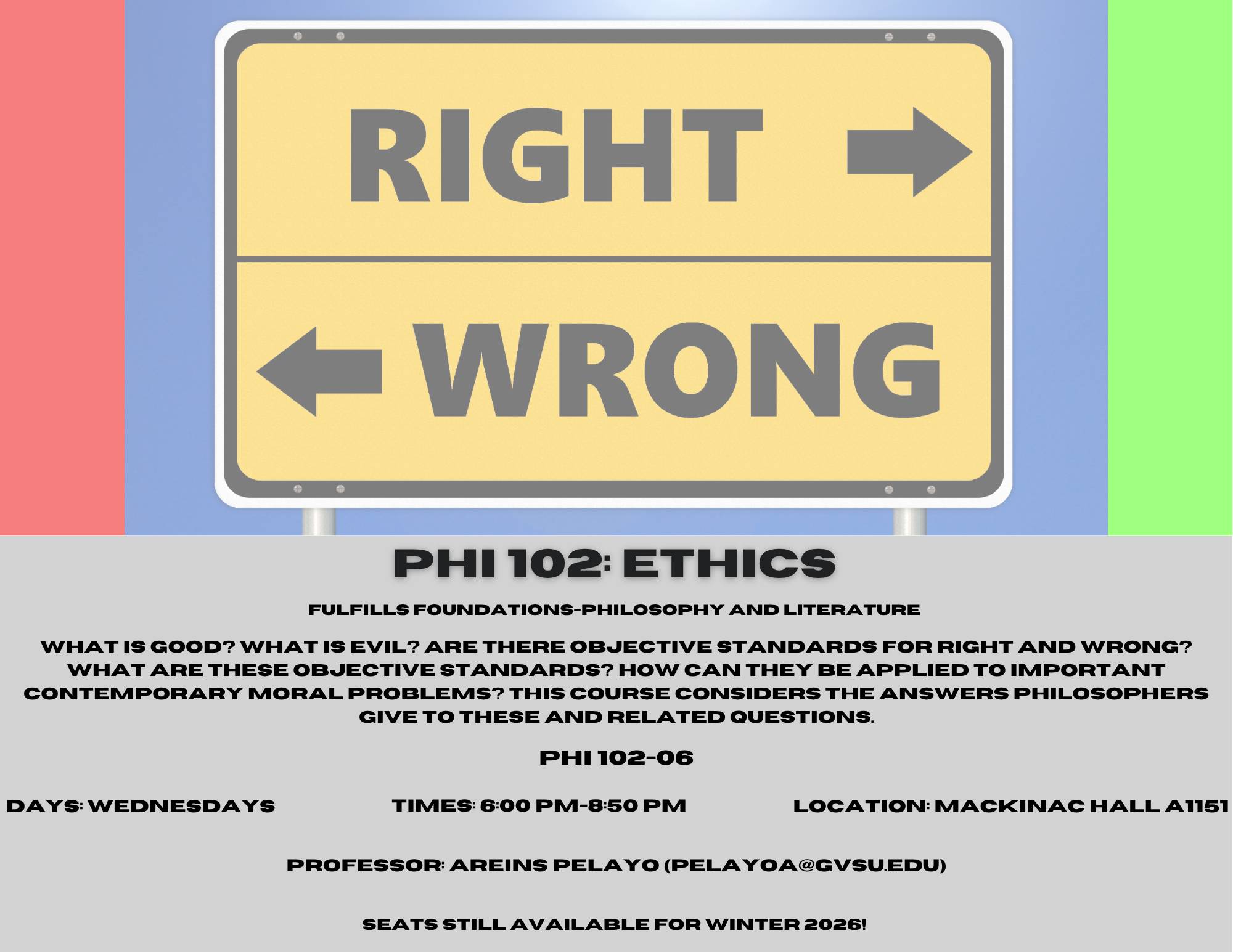
PHI 102: Ethics
What is good? What is evil? Are there objective standards for right and wrong? What are these objective standards? How can they be applied to important contemporary moral problems? This course considers the answers philosophers give to these and related questions.
Fulfills Foundations-Philosophy and Literature
PHI 102-06 with Professor Areins Pelayo (Questions?: Email [email protected]) on Wednesdays 6:00 PM-8:50 PM in Mackinac Hall A1151
Seats Still Available For Winter 2026!
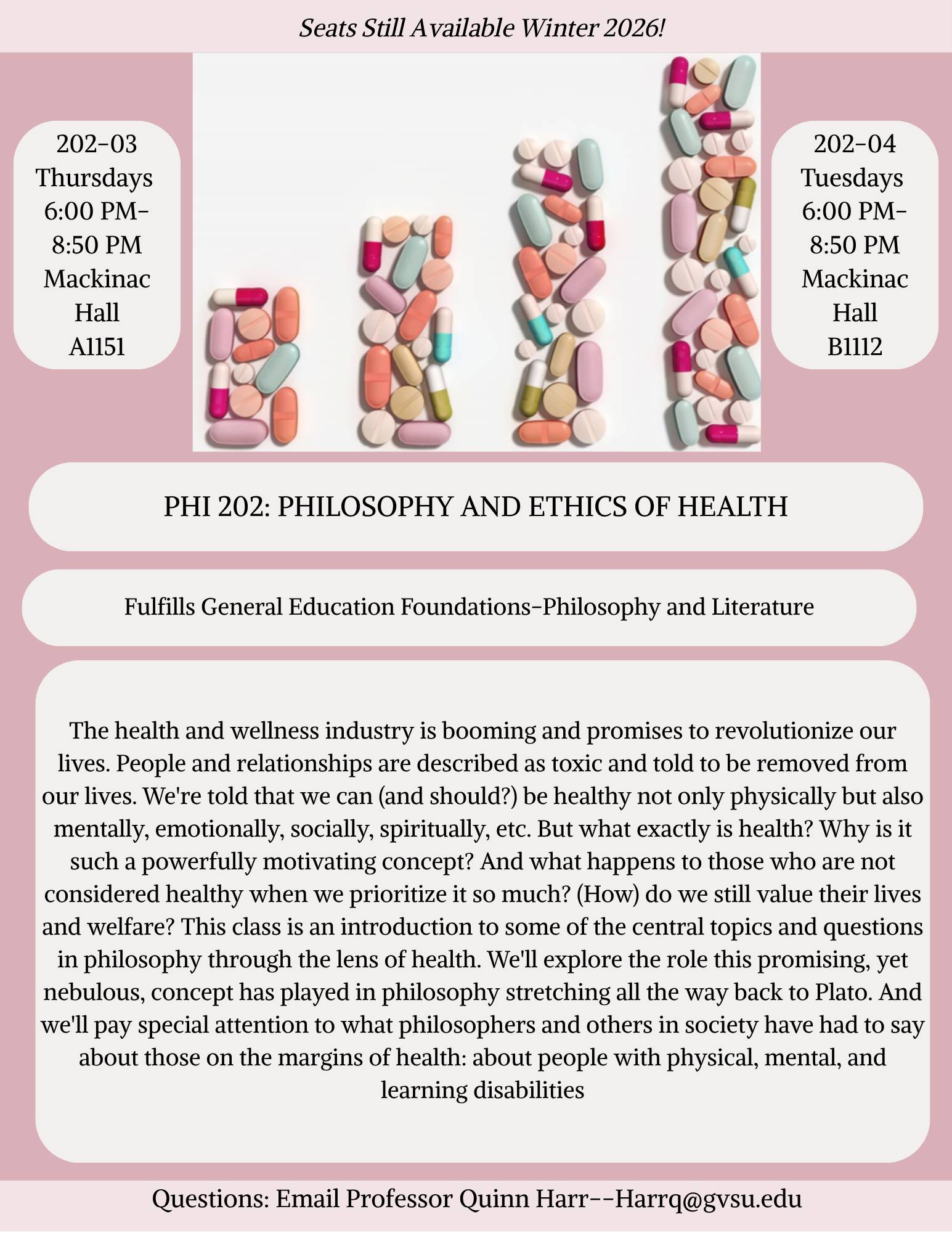
PHI 202: Philosophy and Ethics of Health
The health and wellness industry is booming and promises to revolutionize our lives. People and relationships are described as toxic and told to be removed from our lives. We're told that we can (and should?) be healthy not only physically but also mentally, emotionally, socially, spiritually, etc. But what exactly is health? Why is it such a powerfully motivating concept? And what happens to those who are not considered healthy when we prioritize it so much? (How) do we still value their lives and welfare? This class is an introduction to some of the central topics and questions in philosophy through the lens of health. We'll explore the role this promising, yet nebulous, concept has played in philosophy, stretching all the way back to Plato. And we'll pay special attention to what philosophers and others in society have had to say about those on the margins of health: about people with physical, mental, and learning disabilities.
Fulfills General Education Foundations-Philosophy and Literature
PHI 202-03 With Professor Quinn Harr (Questions?: Email [email protected]) on Thursdays 6:00 PM-8:50 PM in Mackinac Hall A1151
PHI 202-04 With Professor Quinn Harr (Questions?: Email [email protected]) on Tuesdays 6:00 PM-8:50 PM in Mackinac Hall B1112
Seats Still Available For Winter 2026!
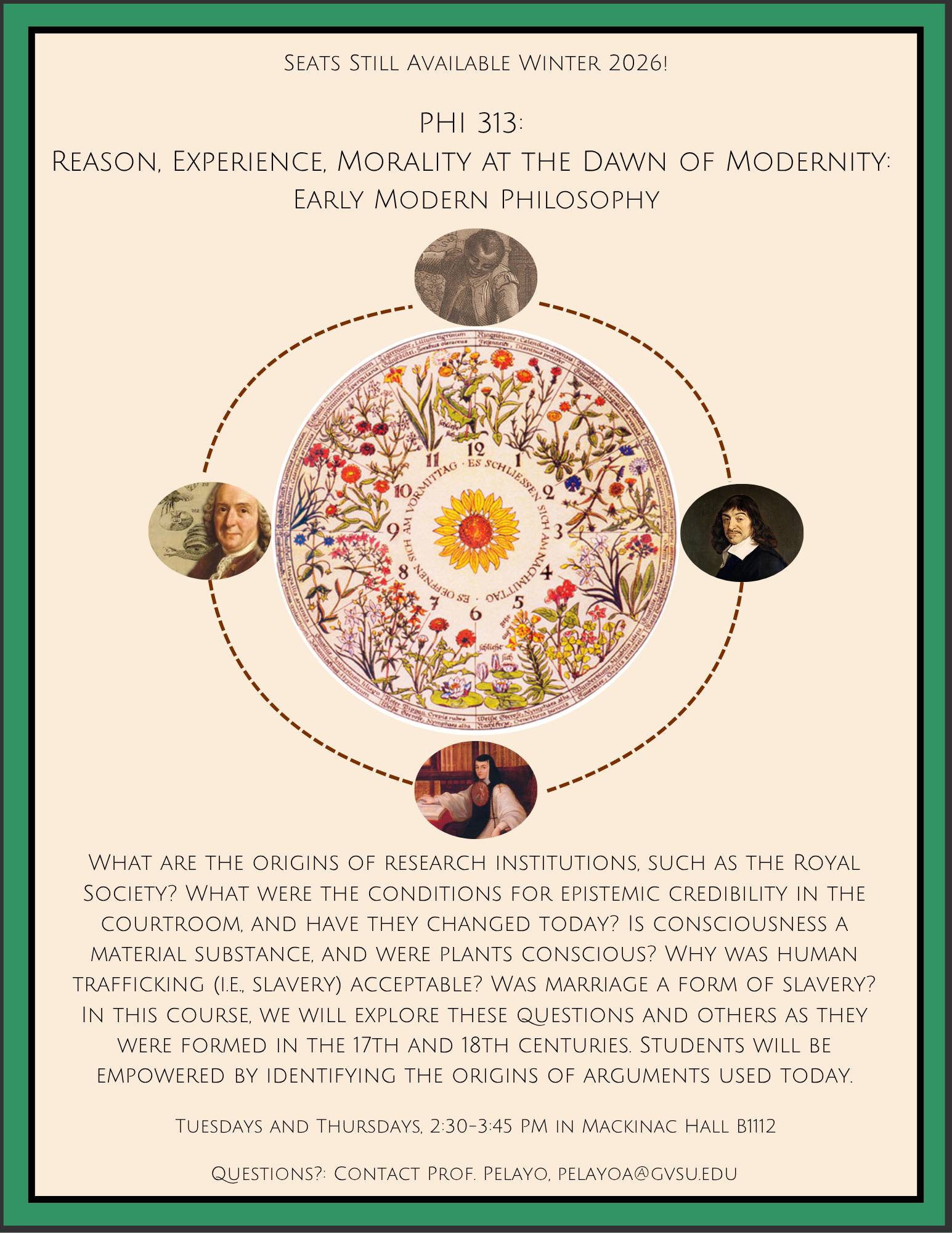
PHI 313: Reason, Experience, Morality at the Dawn of Modernity: Early Modern Philosophy
What are the origins of research institutions, such as the Royal Society? What were the conditions for epistemic credibility in the courtroom, and have they changed today? Is consciousness a material substance, and were plants conscious? Why was Human Trafficking (i.e., slavery) acceptable? Was marriage a form of slavery? In this course, we will explore these questions and others as they were formed in the 17th and 18th centuries. Students will be empowered by identifying the origins of arguments used today.
PHI 313-01 With Professor Areins Pelayo (Questions?: Email [email protected]) on Tuesdays and Thursdays 2:30 PM-3:45 PM in Mackinac Hall B1112
Seats Still Available For Winter 2026!
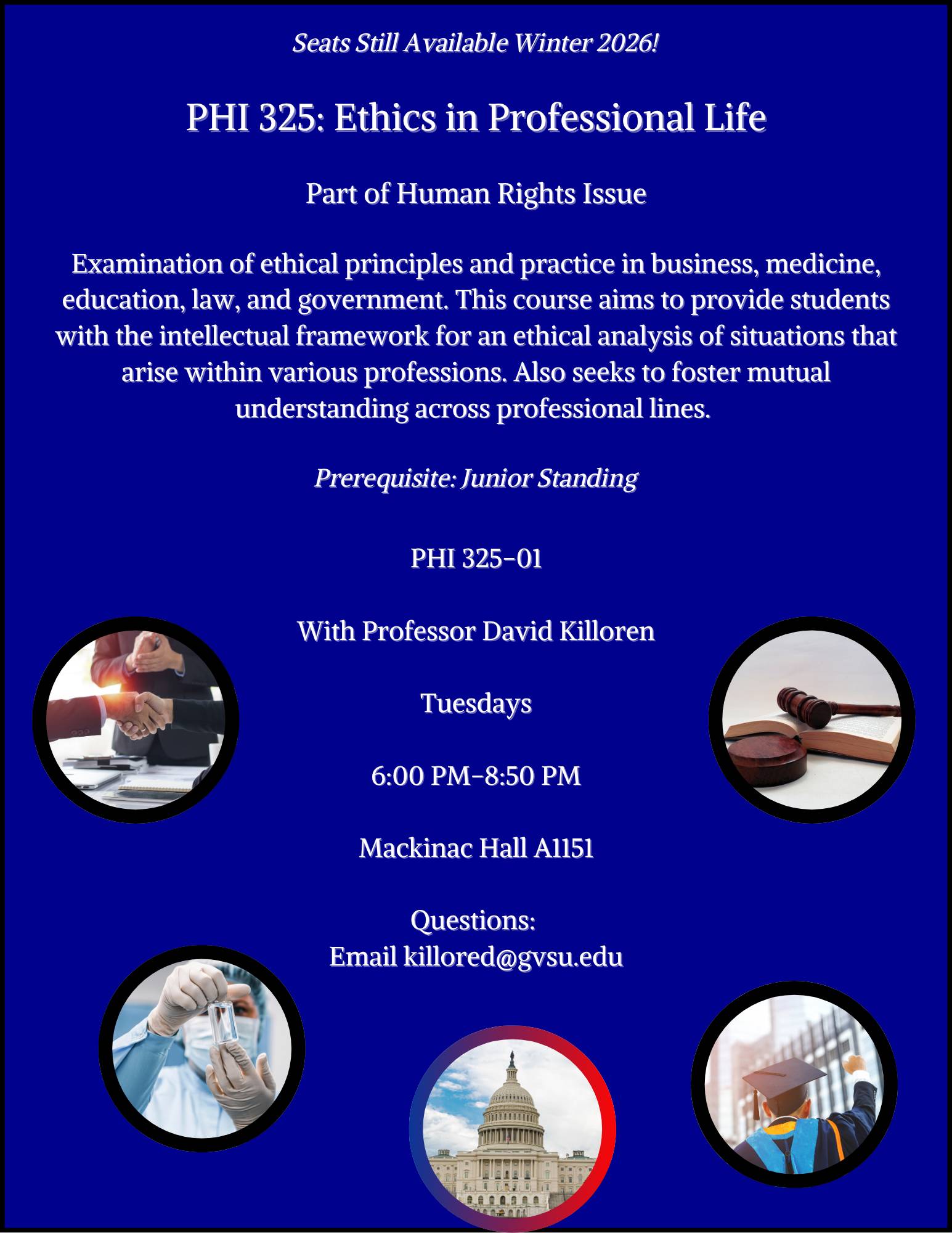
PHI 325: Ethics In Professional Life
Examination of ethical principles and practice in business, medicine, education, law, and government. This course aims to provide students with the intellectual framework for an ethical analysis of situations that arise within various professions. Also seeks to foster mutual understanding across professional lines.
Prerequisite: Junior Standing
Part of Human Rights Issue
PHI 325-01 With Professor David Killoren (Questions?: Email [email protected]) on Tuesdays 6:00 PM-8:50 PM in Mackinac Hall A1151
Seats Still Available For Winter 2026!
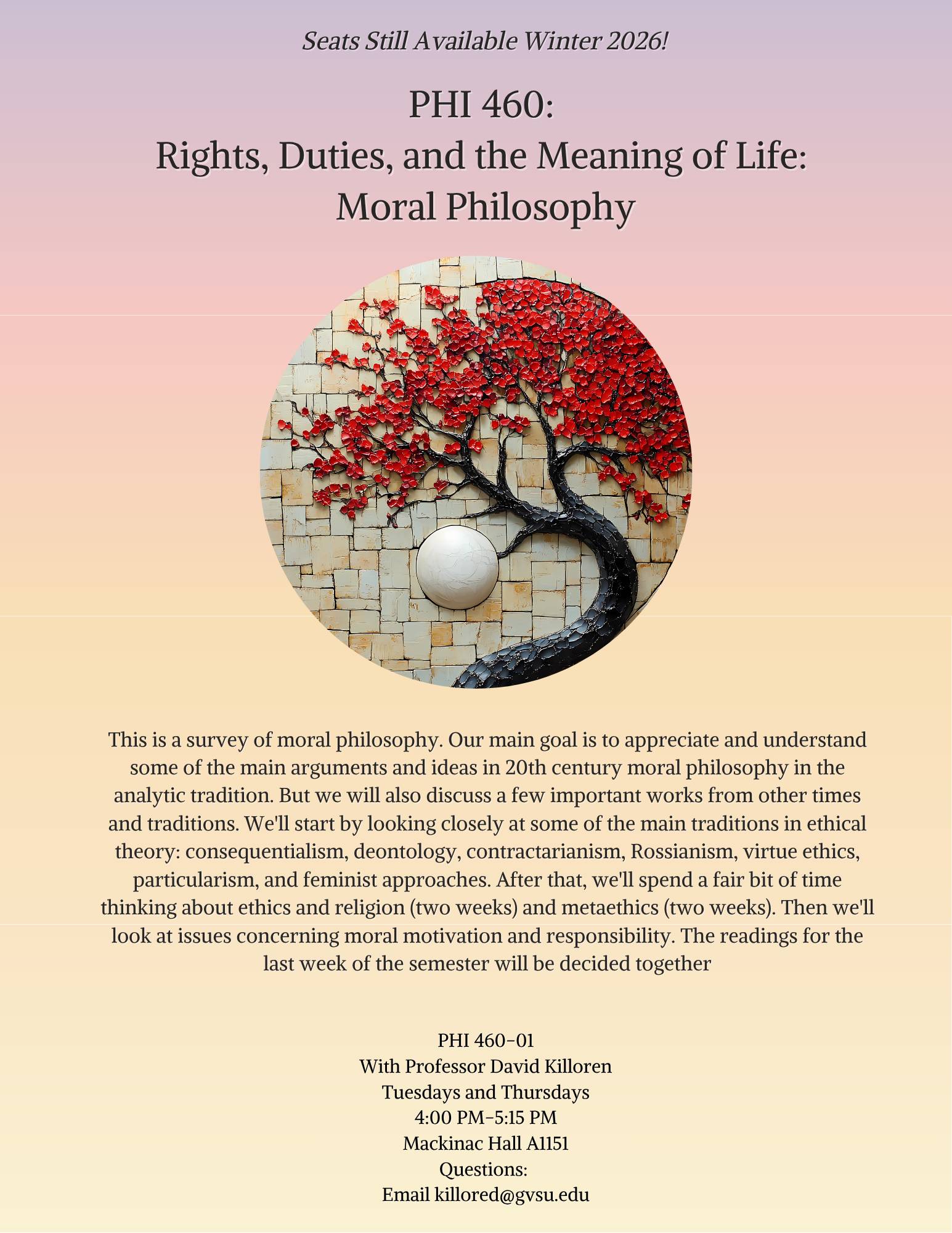
PHI 460: Rights, Duties, and the Meaning of Life: Moral Philosophy
This is a survey of moral philosophy. Our main goal is to appreciate and understand some of the main arguments and ideas in 20th century moral philosophy in the analytic tradition. But we will also discuss a few important works from other times and traditions. We'll start by looking closely at some of the main traditions in ethical theory: consequentialism, deontology, contractarianism, Rossianism, virtue ethics, particularism, and feminist approaches. After that, we'll spend a fair bit of time thinking about ethics and religion (two weeks) and metaethics (two weeks). Then we'll look at issues concerning moral motivation and responsibility. The reading for the last week of the semester will be decided together.
PHI 460-01 With Professor David Killoren (Questions?: Email [email protected]) on Tuesdays and Thursdays 4:00 PM-5:15 PM in Mackinac Hall A1151
Seats Still Available For Winter 2026!

PHI 470: Philosophy of Language
An introduction to the philosophy of language centered around timely topics like lies and propaganda. Main texts include Jennifer Saul's Lying, Misleading, and What is Said: An Exploration in Philosophy of Language and In Ethics (2012, Oxford University Press) and Jason Stanley's How Propaganda Works (2015, Princeton University Press). These texts will be used to introduce and explore foundational background topics in the philosophy of language within the analytic tradition. Authors within the American pragmatist and continental traditions will also be explored.
PHI 470-01 With Professor Quinn Harr (Questions?: Email [email protected]) on Tuesdays and Thursdays 1:00 PM-2:15 PM in Mackinac Hall D1117.
Seats Still Available For Winter 2026!
Articles/Interviews
Professor Judy Whipps is featured on the Society for the Advancement of American Philosophy’s homepage in their “I am an American philosopher” interview series. Read the whole interview here (https://american-philosophy.org/i-am-an-american-philosopher-interview-series/i-am-an-american-philosopher-judy-whipps/)

Professor Judy Whipps
Recent Happenings For GVSU Philosophy

GVSU philosophers in the world: Professors. Wenhui Xie and Andrew Spear at the world Congress of philosophy in Rome, August 2024. Professors Xie and Spear both presented their research, attended other sessions at the conference, and spent some time one evening checking out the architecture of Rome.
Past Events


Majors Fair
BMS and Philosophy Major Jonathan McCabe and Prof. of Philosophy Andrew Spear want YOU to major in Philosophy!


